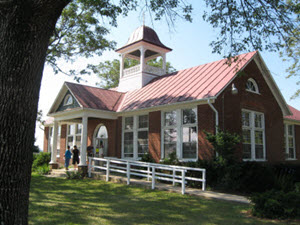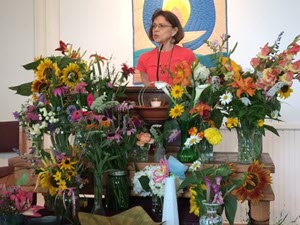
HUU Sermon Archives
Social Justice: Overwhelmed and Excited!
by Sarah Cheverton
November 23, 2003
Part 1
Overwhelmed. Overwhelmed. That’s how I feel a lot these days. Too many commitments, too many animals at home.
And it’s how I feel when I imagine the magnitude, the breadth, the sheer number of our world’s social problems—as evidenced by this small box of materials handed over from the earlier Social Justice Committee — and the complexity of their solutions. Where do the problems exist? Why do they exist? Who’s suffering the most? When is something a social problem and when is it just a different way to live? How do we resolve these problems? When are we simply placing band-aids on wounds that never heal? What new problems do we create as we apply solutions to our current problems? When are we projecting our values onto those we see as “less fortunate” and work for something they really don’t want?
I suppose that we will never answer these questions completely. At least I never will. But in preparation for this service and for participating on the new Social Justice Committee, I thought it necessary to assess my thoughts, feelings and experiences related to social justice. And that is what I will share.
When I graduated from college in 1982 with a BA degree in Psychology and Sociology and consequently no meaningful job prospects, I was surprised when 2 part-time jobs fell into my lap. One was as a live-in caretaker for a woman who had just come home from the hospital after a stroke and for her mentally ill sister and their little dog. The other was as the Delivery Coordinator for a wood ministry started by my dad and his colleagues back in the 70’s in Lynchburg. Through both of these jobs, at what now seems like the very young age of 22, I saw things and dealt with things that I really haven’t since.
The purpose of the Wood Ministry was to provide free wood to people in the community whose source of heat was a wood or tin stove and who were unable to purchase enough fuel for the winter. My job was to visit individuals who called to request wood. The person who took the calls tried to determine who was in most need that day and prioritized the list for me from most critical to least critical. The purpose of those visits was 3-fold: to check on the caller’s situation in general; to determine when they might need wood delivered and how much; and to ensure they had signed up for the city’s fuel assistance program.
I met many wonderful people through this job. People who invited me in for a snack, people like Mamie Merchant who just wanted to talk, people who were kind and gracious despite their living conditions. I also experienced less pleasant situations. Like my visit to Laura’s house where I was met at the door by her schizophrenic son yelling intense four-letter words and threatening to hurt me if I came in; where the house was filthy with rat droppings and grime and stink; where Laura was so sick and elderly and neglected that her frail body and vacant stare were the most memorable things about her. Like my visit to a woman who had become so desperate for heat that after she burned her wooden furniture, she burned a piece of rubber in her tin stove until the stove pipe was nothing but a glow of orange. Like the many homes I visited where the temperature was stifling because the occupants feared any reminder of being cold. Like the time I knocked on the door of a high-school classmate who promptly slammed the door in my face probably from embarrassment or resentment.
And then there was Pearl, the woman who had the stroke. She was a gem, and by the time my employ there was done, I loved her like a grandmother. Her sister was a bit more challenging. She was a bit on the grumpy side and occasionally asked me to go find her son, a practicing alcoholic who lived in a dingy, dirty apartment building and who really didn’t care too much about his mother’s needs. I suspect that part of her mental problems stemmed from a deep despair and loneliness. I always enjoyed it when I could get her to laugh.
About a year later, I found a “real” job, i.e., full-time with benefits and a salary. My job was to help poor people prepare for and find gainful employment. Except for 2 years in the business of helping America gain weight with Little Debbie Snack Cakes, I stayed in the employment training field for 12 years. I met 55-year old women who had worked in the same sewing factory their entire lives and suddenly found themselves having to learn new skills so they could make it until retirement; 18-year old high school dropouts with no motivation, with drug problems and virtually no family support trying to imagine a future for themselves; 30-year old welfare moms with 5 children and a couple of grandchildren who were being forced off of ADC and into the workplace to scratch out a living on minimum wage; a prison inmate who had been incarcerated since he was 17 and was being released at the age of 32 with a smattering of job skills he learned on the “inside.”
I used to look into the faces of these people and see the fear, the despair, the doubt. I imagined myself being suddenly cast from all that is familiar and asked to do and say and be things that I had never been, to suffer the ridicule hurled by employers who have no clue, and the pain when I lost my job because I couldn’t find a babysitter for the second shift. These were real people with real lives and real problems and yet I walked away every single day of my easy, predictable and happy life with an air of self-righteousness and a message in my brain that said, “No, it’s not just luck or fate; I’m responsible for my success.” I was trying to make myself believe that I could never end up in the places they were, that I was above it, that in some small way, I really was better than they were. But all along, in the corners of my mind, I knew there was only a thin veil between my life and theirs; one wrong move and I could be there. I did not feel particularly effective in making a difference in their lives—the solutions seemed so complex--- so I doubted my ability to take care of myself if something “big” happened to me.
Now, you might remember that I did this review to assess my thoughts, feelings and experiences related to social justice. And the results of my assessment show that I was overwhelmed and somewhat frightened by what I saw. While it’s possibly true that I have a broader set of survival skills and a stronger support system than some, I must quote something that someone recently said to me: “I don’t want to imagine what could happen…. so I just won’t.” And that’s what I did. Over the years, I slowly disengaged from working for social justice issues. I turned away from them, from the daily reminder of how difficult life can be and from the frustration in searching for an answer. I enrolled at JMU and earned a Master’s degree in Organizational Development, tried my hand at corporate training and finally came to JMU as an employee to teach faculty the fine art of integrating technology into their instruction. I write checks, but I don’t engage. Safe.
Part 2
Excited! Excited! That’s how I feel when I remember that 3 people talked to me during last Sunday’s Coffee Hour about their social justice passions and ideas for social action. It’s how I feel when I remember this past Tuesday evening when 8 people met at Dale’s house for the first meeting of the new Social Justice Committee, when the simple question, “What can our role be for HUU?” elicited 90 minutes of energetic discussion about ways in which we can act on our passions as a group and help others in the congregation to act on theirs. It’s how I feel when I remember that 2 days ago a small group of people quickly agreed through a series of email exchanges to watch the new documentary, “Uncovered: The Whole Truth About the Iraq War” at 5:30 on Sunday, December 7 as part of a national house party event sponsored by the MoveOn Organization. I feel excited when I learn more about what the national Unitarian Universalist Service Committee is doing around the world to fight for human rights. It’s how I feel when I remember what all of you already do towards social justice.
And I was excited to find the following three things: a book I’d been looking for for 20 years called Rules for Radicals: A Practical Primer for Realistic Radicals written by Saul Alinsky in 1972, another book called The Kid’s Guide to Social Action written by Barbara Lewis in 1991, and in the November/December issue of UU World, the written adaptation of Rosemary Bray McNatt’s lecture, “Love and Power: The Universalist Dilemma” given at GA this summer. I was lucky enough to hear the recording of this lecture just last month. I would like to share a little from each of these. However, the Alinsky book did not arrive in time and the Library copy is out. So I’ll share a little from the Kid’s Guide and from the McNatt lecture.
The Kid’s Guide includes 10 Tips for Taking Social Action and while this is a little kid’s book, the tips are certainly applicable to us big kids. There are two I’d like to mention today:
1. Build Coalitions of Support
According to Lewis-----
a coalition is a group of people working together for the same goal. Find all of the people you can who agree with your solutions….. This is very important to do. The more people you have on your team, the more power you will have to make a difference.
According to Robert Putnam in the book, Bowling Alone, participation in American civic and social group activities has sharply declined over the past 3 decades. His thesis is that this loss of “social capital” will have serious consequences for our future. I believe that the situation is changing and where technology was in part responsible for causing our isolation, it is now bringing us together in new ways. I am excited to see the signs of coalition building happening in the HUU community.
2. Don’t Give up
Lewis tells the kids, “Don’t give up. Don’t pay too much attention to folks who tell you all the reasons why your solution won’t work. If you think your cause is really important, keep picking away at it.”
Last year a JMU faculty member invited me to participate in a grant funded by the Mosier Fellowship (by the way, Elizabeth Ihle was a Mosier Fellow in 1999). In the grant, I assisted her students in creating 11 health-related web sites that would be used with at-risk high school students enrolled in the Phoenix Alternative Program in Waynesboro.
This past Thursday, Dr. Hulton reported on the results of her project. Her program evaluation results showed that a large majority of the students enjoyed the program, thought the program and materials were good and enjoyed the technology. This is what we call the “smiley face evaluation.” At the next level, the behavioral level, only 30% of the students had started to change their health-related habits.
At an earlier time in my life, I would have focused on the 70% who had not changed their behavior. But now I’m focusing on the 30% who did and as Mr. Mosier said, “it’s a group of kids who may have otherwise done nothing towards improving their health.” The cynic in me would say, “Well, perhaps they’re the kind of people who would have changed anyway.” The positive chair of the social justice committee says, “I want to imagine what can happen and believe that in fact every little bit does help.”
Rosemary Bray McNatt is the senior minister of the Fourth Universalist Society in New York City. When I first listened to her lecture, I was inspired by her to-the-point criticism of our approach to social justice:
We feel good about the commitments we make, and in so doing, we make a point as well: We make sure that our hands are clean, that we are disconnected from the big horrors and the small ones that plague this broken world. We make it clear that our hearts are pure….. Above all else, we are wedded to innocence. We believe that “love will guide us through the hard night.” But I am not so sure of that as I once was; I have found myself afraid for our faith—afraid that we have embraced a love too sentimental, too anemic, too powerless to matter in a world filled with unspeakable acts committed by people who have no interest in our witness. I am afraid that we have embraced only the symbols of love and justice and peace with no commitment, and often no clue about what we will face at the moment we attempt to make these things real.
While her words seem to hint of disillusionment, I am excited by her message. I find inspiration in her challenge to me to roll up my sleeves, to get my hands dirty as many of you already do, and get involved with the realities, the entire realities of the problems we try to solve.
Conclusion
I’ve never lost the desire to “be a part of the solution instead of the problem,” but have constantly struggled with how to be that. Thankfully, something has changed in me. Perhaps it’s just the medication, but I feel more hopeful. I have more successful experiences to draw from. I have more skills required to make things happen. I am less inward and more outward. I have a more realistic and less fatalistic view of what impact social action can have on our community. I’ve learned to close my eyes and jump, to take the leap of faith, to believe that envisioning the possibilities can lead towards the existence of realities. And I am surrounded by people whose enthusiasm is infectious and knowledge is phenomenal. I have come to learn how social impact happens in small and surprising ways, that being truly present, that truly listening or that simply having confidence in someone’s ability to move forward can sometimes make all the difference.
And now, I would like to share with you some images of social action from HUUers who make it happen. Some actions are associated with specific people, others not. I hope you enjoy it.
Read more sermons or talks by Sarah Cheverton.
For the latest sermons and events at HUU, visit our Community Cafe.
Inclement
Weather Policy
Worship
Service Materials


UUs on YouTube
Our denomination has an official presence on YouTube! The Unitarian Universalist Association's YouTube site includes several videos and lots of interesting commentary.
Harrisonburg Unitarian Universalists 4101 Rawley Pike | Harrisonburg,
VA 22801
Mailing Address: | PO Box 96 | Harrisonburg, VA 22803
| (540) 867-0073 | Webmaster
HUU is a member of the Southern
Region of the Unitarian Universalist
Association
Privacy Policy &
Disclaimer
Site Design & Maintainence : Expression
Web Tutorials & Templates


